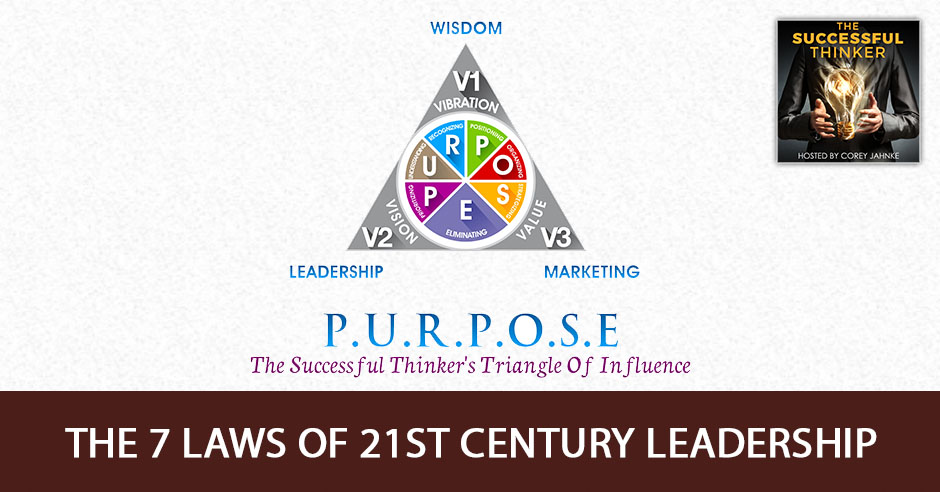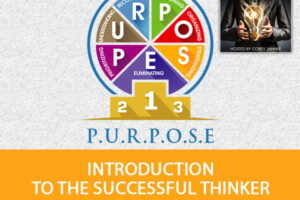
When Corey Jahnke’s boss came to him with tears in her eyes because she was instructed to cut their staff by two full-time employees, he was devastated and not sure how they were even going to get by. They knew that they were wrong when they said they would have to do more with less. Corey resolved that the only way they could do more was to become more. He embarked on a journey to develop a system that would help him and his team get the most out of themselves and each other. The results were the creation of seven simple laws that changed everything for them as they will for you and your team.
—
Listen to the podcast here:
The 7 Laws Of 21st Century Leadership
How Successful Thinkers Change Their Outer World By First Changing Their Inner World
I want to talk to you a little bit about how The Successful Thinker came about. I remember it just like it was yesterday. My boss was sitting there in front of me. She had her head on the table and she said, “I don’t know how to tell you this, but you’re going to have to go ahead and cut two full-time workers.” I was working in a busy pharmacy. We would service at least 500 prescriptions a day and we thought we were having all we could do to get people in and out of the door at that time. After all, when the customers are staring you in the face every day all day, you get fatigued. You get in these systems and you struggle to try to find a way to get the customers in and out of the door and what do you have? You have people above you who believe that it’s possible to squeeze water out of a rock. They want to go ahead and tell you that it’s easy to do more with less. Remember that phrase because they kept using it on us. They kept saying, “You people at store level need to learn how to do more with less.”
You’re already a successful thinker and you know that’s not possible but here’s the problem. The problem is those people were not going away. She said to me, “If you don’t cut those two people out of your store, then I have to do it. If I don’t do it, they said they were coming down from the corporate office to do it themselves. Those two people are going.” She said, “I don’t know what to do because I’ve got to have the same conversation with every single store in my market.” I’m standing there waiting for the punchline and the punchline never came. She had tears in her eyes and I knew this was painful for her because she was relatively new in the district. She was a very kind lady, but she was not a connector. I knew that she had problems in almost every single store that she operated. She said to me and I’ll never forget it, “I need you to endorse me. You’re the person in our district with the most influence because you’ve been here the longest. People have been going to you every time there wasn’t a district manager in place or the district manager was out of town. If you don’t support me on this, I know that I’m going to end up getting fired.”
I said to her, “It’s got to be more than that though. We’ve got to figure out how our stores are supposed to get by with less people.” We sat down and we brainstormed some ideas and the big thing that we took away from our brainstorming session was you can’t do more with less. You have to do more by becoming more. In other words, what you have to do is change your outer world by first changing your inner world. Let’s face it, the greatest barrier to change is our own resistant to change and our attachment to the way things currently are. One of the most frustrating things you can ever face is that person who says, “This is the way we’ve always done it. This is the way we should always do it.” I sat down and I tried to think about what could we do to give our customers the same level of service with less man-hours?
The greatest barrier to change is our own resistance to change. Share on XEven before that, I was facing a bigger problem. I had basically been told that two people on my team no longer had a job. That was my main concern. My first concern was how do I take care of these people? I was lucky because I was in a pharmacy inside a larger store. I went to the larger store manager and I asked him if he could somehow absorb the two people that had to go. He was a very kind man and he took those two people and he gave them jobs. It wasn’t that I had to fire two people, it was that I was able to relocate two people within my store. What it also meant was that I had to look at the remaining six people and say, “We are down 20%. We’ve got to make it work and we’re going to make it work better than ever before because if we don’t, they’re going to come in and replace me with somebody who’s more efficient than I am. What that means to you is efficiency often somehow in our world involve kindness.”
When we think of people who are super efficient, a lot of times we know instinctively that those people aren’t exactly as kind as we would hope they would be. What we wanted to do is create a system that would be efficient and kind. Here’s what we did. We sat down with Survey Monkey and we created a survey of the types of people that were working for us and with us. What was cool is Survey Monkey sets up so that you can give them, the audience, that you want to ask the questions to. We were asking questions about efficiency at work, about kindness at work and about what’s important to the people that we worked with. One of the big questions we asked is what gives you the greatest feeling of job satisfaction? What makes it worth coming to work? We asked about benefits. We asked about the salary. The most interesting discovery that we made was that far in a way, people chose the opportunity to make a meaningful contribution at work as their number one motivator.
Above salary, above benefits and above their coworkers, about 67% to 70% of the people chose the opportunity to make a meaningful contribution at work as their number one employee-related value. I was completely shocked by that. We want to believe what we hear people are saying, because people are always complaining about not having enough money or how the insurance is lousy and so forth, but when the rubber meets the road, what they really want is a reason to get out of bed in the morning. At least that’s what the survey showed. What I did is I sat down with my staff and I said, “Tell me about this. Why would this happen? Is this true that most employees want an opportunity to make a meaningful contribution at work, to make a difference over salary and benefits?” I remember one of my favorite people, a girl named Missy said, “Corey, the only thing that makes it worth the guilt of leaving your family at home is that you know that you’re helping people, both that you work with and that you serve.” I remember shaking my head and I remember saying to myself, “That is absolutely brilliant.”

21st Century Leadership: People are always complaining about not having enough money and so forth, but when the rubber meets the road, what they really want is a reason to get out of bed in the morning.
Most people don’t realize that that’s what you’re doing when you’re at work. You’re making a sacrifice of your time away from your family. A lot of people get stressed out at work. Then they go home and they take work home and they’re also sacrificing their family both in time and attention. If you’re not making a meaningful contribution at work, it turns out that that makes it even more stressful to your family at home. It makes it so that it’s not worth it. I believe that in most cases, it creates a feeling of despair. I live in America, which is arguably one of the most prosperous countries in the world. We’re sitting here with most of our workers in despair. It doesn’t take much to look through the research surveys about employee satisfaction at work and to find out that it’s in short supply.
I wanted to change that and what happened was that I was getting calls from other pharmacy managers who are saying, “The supervisor was here. They’ve cut our budget by 20%. We’re having all we can do to make ends meet. By the way, in case you weren’t paying attention, they went ahead and added two more things that we have to be responsible for. How are we supposed to do this?” We took the attitude that the only way we could do more was to become more. That meant that we had to get more out of our entire team. Not just me, not just my workers, but all of us out of the district manager and out of our team. These big corporations, it’s funny because the level above you seems to be the ceiling. After all, it all rained down from the top and then you, your boss and the people directly below you on the corporate ladder have to make it all work out. We came up with what we called The Successful Thinker’s Triangle of Influence.
What we wanted to do is we wanted to take that P.U.R.P.O.S.E. Formula that I talked about in the last episode: Prioritizing, Understanding, Recognizing, Positioning, Organizing, Strategizing and Eliminating. We wanted to create a leadership philosophy around that. We wanted it to be something that wasn’t necessarily found in the books because as you and I know, theory doesn’t work in the real world. Theory does not work in the modern world. We were working with people above us who are saying, “Just crack the whip. In my day, you told the guy to do something, you threatened him, you browbeat him and he did it. You could work them as hard as you wanted to, then they would do what you said and things would get done. It didn’t matter if people’s feelings were hurt, if people were struggling and stressed. People were pushable. Push them harder.” That was the answers we were getting from above us.
Theory doesn't work in the real world. Share on XYou and I know that in this world, that doesn’t work anymore. It’s pretty simple. Our grandparents knew that if they went to work every day for 40 years, they would get a gold watch. They would get a pension. Grandma would take care of everything while they were at work. Even if they were browbeaten and punished while they were at work, it was worth it because they were providing for their family. They had some semblance of security and they felt good about what they did. In the modern world, we’re stuck because we don’t believe that our job may be here in five years. We don’t know that our employers will be here in five years and certainly we don’t believe in the idea of a pension. We’re struggling between how do we maintain our sanity and maintain our family, because everybody’s running around in seven directions, do a great job at work and make sure that we feel good about what we do.
We looked at the P.U.R.P.O.S.E. Formula and we said, “How do we roll this out to people that don’t necessarily have the same values that we do, to people who don’t look at work the same way that we do, and to the people who we need their help?” I remember reading Stephen Covey’s landmark book called The 7 Habits of Highly Effective People. If you’re not familiar with the book, it’s amazing because what he talks about is you’ve got to win the private victories first. You’ve got to get your own head together before you can get anyone to follow you anywhere. Then you collaborate and work together to find meaningful solutions where everyone wins and that’s really critical in this world. Everyone has to win or everyone loses. In most businesses, in most companies, what’s going on now is that we are caught to the point where if someone calls in sick or if someone shows up working at half speed, we’re stuck. We’re in trouble. How do we do that? How do we go about getting other people to get on that same program? It starts with winning that private victory. We sat down with our group. We sat down with our books. We sat down with our reading materials and we sat down with the people who are winning out there in the field and we came up with the Seven Laws of 21st Century Leadership.

The Successful Thinker
The Successful Thinker is a parable story about workers in the modern world who are winning using the Seven Laws of 21st Century Leadership. What we did is we wove in a way that you could do more by becoming more. How you could grow your inner climate to the point where other people want to get on the program with you who are willing to follow your lead. They are able to grow and help you grow because you’re leading by example and because you’re growing. You’re increasing your influence. You’re able to get more things accomplished in less time because you’ve sharpened your focus. You’ve sharpened everyone else’s focused and this is really critical, you’ve distributed the workload amongst people because you recognize that other people need to make a meaningful contribution. What I see in the field these days is that many people will not delegate because they feel that they are responsible for the results. If I’m responsible for the results, I have to do it.
Law Of The Contribution
There’s a basic math problem with that. If you’re doing ten things, it’s impossible for you to do ten things well. If you’re doing five things and Missy is doing five things, it increases your odds of both of you doing things well. If I’m responsible for the results, I want to have other people who are more talented in areas that I personally suck in doing those things. What happens is that when you sell that paradigm to the people who are looking to make a meaningful contribution in the first place, you give them personal power. You give them a reason to, as Missy so aptly put it, not feel so guilty about not being home with your family and you get better results overall. Successful thinkers look at the big picture and they do what Jim Rohn said, “It’s not what am I getting here, it’s who am I becoming here.” The idea is that we increase our overall output and efficiency by growing ourselves and our team internally and creating much better external results. The first Law of 21st Century Leadership is what we call the Law of the Contribution.
I spent 25 years of my career talking to patients one-on-one about their lives. They shared with me what they were so proud of when they work and what they did. Years ago, people had manufacturing jobs and they would make stuff so they could say, “Do you see that car going down the road? I put the mirrors on that car. I was someone who designed this step in this product and this product does A, B and C.” Now, we’ve moved more into an information and service economy. What we find is that people have a tough time understanding what their contribution actually is. As leaders, as managers and as parents, we can do an excellent job if we go ahead and share with them, “This is what we’re looking for from you. This is why we need you so badly and this is why you’re so important to the team. By the way, you’re doing a wonderful job keeping our customers happy because our customers are the lifeblood of our business.”
Law Of The Story
We looked at what people were telling themselves internally and we developed the second Law of 21st Century Leadership, which is called the Law of the Story. You and I know that we’re bombarded by negativity everywhere we turn around. We have negative news coming at us hundreds of miles an hour. We have people who are so good at making a problem out of every solution surrounding us. We live in a culture of highly offended people, of complainers and of people who say, “It’s not fair.” I remember a great quote that a guy said, “When people tell me life’s not fair, I say ‘Compared to what?’” We talked about the Law of the Story and it says essentially that if you want a better life, you’ve got to tell yourself a better story. We began to train our people to go ahead and look for areas of their lives where they are grateful, where they believe that their life is good and where they see the opportunity for their life to get better. We trained them on how to tell themselves a better story.
If you want a better life, you've got to tell yourself a better story. Share on XWhen anything happens, you tell yourself a story about it. For instance, you go out to the mall and you wanted to get one thing and you’ve got to park five miles away from the mall. You’re sitting out in Timbuktu in the parking lot of the mall. You can grumble and complain that it’s cold out and, “I was in a hurry and now I got to walk all this way to the store,” or you can tell yourself a better story. You can tell yourself, “This is great because now I’m getting the opportunity to get an extra 300 steps in, that I wouldn’t have gotten in if I was able to park closer to the mall. I’m getting a chance to get some fresh air. I’m getting a chance to clear my mind.” It’s the same situation. You’re still parked out in Timbuktu, but you feel better about it. In The Successful Thinker, we tell a couple of great stories about how you work inside of your own head first and how you get the opportunity to explain things to yourself. The way you explain things to yourself is what determines your outcomes in life.
Law Of The Agenda
Then we realized that one of the biggest problems at work now is that everyone is steamrolling everyone else’s agenda. We created the Law of the Agenda. You are going to work. You have a certain amount of things that you expect to be getting done before you leave. You’re going to do A, B, C and D. You walk in, you’re fired up, you’re ready to roll and right away your day falls apart because your supervisor calls and says, “Steve, drop what you’re doing. You’ve got to work on my problem.” There it goes, out the window. You can fight that and say, “That’s not fair. I was going to get all this stuff done and now my boss has done this.” You can slam your books. You can create strife, grief and internal problems. What you’ll find is you’re still working on Steve’s problem in the first place or you can say, “This is a great example of a way in which I can make my boss’ life easier. I can serve this guy and I can find some value for myself. I can learn something new. I can do something out of the kindness of my heart,” because you’re going to do it anyway.
It’s the story. It’s how you explain things to yourself that determines whether you have a happy life or not. I know as a pharmacist many rich physicians. I can tell you that some of them are unhappy and some of them are amazingly happy. It’s funny because the happier they are, the more you can see that it’s the way they explain life to themselves, “I’ve got to do all these surgeries or I get the opportunity to help people walk better next week than they walked now.” That’s the thing. In your life, everything that happens to you is explained in your head. The way you interpret what happens determines how you feel about it. Everybody knows a guy that should be really happy. He’s got the house that we all wish we had. He’s got the income we wish we had. He’s got the family we wish we had and he’s still not happy because he doesn’t know how to explain things to himself.

21st Century Leadership: Leadership is influence; no more, no less.
Law Of The Connection
Then we developed the Law of the Connection. What we find is that in our society, people are wonderful at communicating, “I can zip off two texts and a Facebook message and an email in a matter of five minutes,” but people are terrible at connecting with other people. You see it, you’re out in the restaurant and here’s a family of four and they’re all on their phones. Every single one of them is communicating with somebody, but they’re connecting with no one. They have the people who are “the most important people in their lives,” right there with them and they are not connecting with them at all.
Law Of The Appreciation
That is part and parcel to the next law, which is the Law of the Appreciation. I had a supervisor give me back an employees’ evaluation and said that I had to rewrite the evaluation. I looked at him and I said, “What are you talking about?” He said, “You rated this person too high.” I said, “You don’t even know this person. How could you know that I’ve rated them too high?” He said, “If you rate people too high, they’re going to think they don’t have any room for improvement. They are not going to try as hard for you.”
I laughed out loud and I said, “If you believe that, why don’t you ask somebody who doesn’t report to you?” If you rate people too low, they’re going to say, “No matter what I do, the guy’s not happy.” If you rate people fairly or even optimistically, then they’re going to say, “This guy appreciates my efforts. I’m going to show him what I can do.” The way Les Brown puts it, “If you treat a man as he is, he’ll remain as he is. If you treat a man as he could be, he will become what he should be.” As a leader, we realized that we set the expectations for people and if we show them that we expect greatness from them and we expect wonderful things out of them. There’s a difference between saying, “I expect you to do the following five things,” versus “I expect you to be an excellent person. I expect you to be great. I expect you to step into that amazing soul that God gave you when you were born. I expect you to show me how amazing you truly are.” It’s an entirely different paradigm. It’s an entirely different frame of mind.
What you can do is get people to surprise themselves and surprise you by becoming more than they ever thought that they could be. When that happens, you develop an internal pride that is almost immeasurable. What’s fun about the Seven Laws of 21st Century Leadership is that you find gladness, joy and a purpose inside of yourself that you never had before. You’re beginning to approach people in a way that they become someone they never were before, directly through your influence. Leadership is influence, no more, no less. I trained with John Maxwell’s team and he kept hammering that point home. The leader is the key influencer in the market. It has nothing to do with the title. It has everything to do with attitude, with the way you treat people and the way you make people feel. You’ve heard it before. When you talk to people, they’ll never remember what you said, but they’ll always remember how you made them feel.
People choose the ability to make a meaningful contribution at work as their number one key to job satisfaction because it eases their guilt of sacrificing their time and energy with their families. You can give them that meaningful contribution. Share on XLaw Of The Student
To do the first five Laws of the 21st Century Leadership, you have to do what Stephen Covey said in The 7 Habits of Highly Effective People, “You have to keep a sharp saw.” What that means is that you have to become a student of life. Leaders are learners. We created the Law of the Student, which essentially says that if you want to step into your own greatness, you’ve got to learn. You’ve got to commit to the idea that, “I wasn’t done educating myself just because I left school.” 90% of people don’t read another book outside of high school. This is not for you. What you want to do is create a system of educating yourself constantly and continuously so that your skills are always growing. Your ability to influence others is always expanding. I love what author and speaker Brian Tracy said about it. He said, “You can do that in three ways.” You can read for 30 to 60 minutes every day in your field or in a field that interests you or in a major skill that you want to learn.
Let’s say you don’t think you’re a very good leader right now. Maybe you read 30 to 60 minutes a day on leadership. There are thousands of leadership books out there and you take an idea and apply it. You give it a try and see what happens. The other thing you can do is attend courses in your area of interest. If you want to be a better leader, there are leadership courses out there until how long you have them. We stack leadership courses out there because there’s such a need for leaders. The biggest problem we’ve got in the world now is that we’ve got far more politicians than we’ve got leaders. Leaders are not someone who are born leaders. There is no such thing as a born leader. Leaders are developed along the way. Leaders are people who have educated themselves on how to influence others. Sometimes it seems like they’re born leaders because it’s the life that taught them what works. Some people’s brains are wired in a way to where they pay attention to how, what they do and say affects other people. Then they’re able to translate that in a way that makes other people want to be more, do more and have more.
The first two steps are that you read 30 to 60 minutes a day and attend courses. People say, “I can’t afford to attend a course.” You can’t afford not to attend the course because here’s the deal. The world changes at light’s speed and if you’re not keeping up with the skills that help you work through other people, to help you grow yourself by growing other people, you’re not going to have a job in five years. You’re going to wish that you had kept that sharp saw. If you can only do one thing, this is the one thing that I would recommend. Brian Tracy said the third thing that you can do is instead of rocking out in your car listening to garbage music, you can listen to audio programs in your car. The average person spends 500 to 1,000 hours in their car a year. If you’re listening to audio programs on leadership, on influence or on sales, if that’s what your job is, you suddenly realized that all of a sudden you get the equivalent of 50 books a year just by driving around.

21st Century Leadership: The number one indicator of happiness in the world now is who you surround yourself with.
If you are reading 50 books a year or listening to 50 books a year or thinking through 50 books a year, that’s 500 books in ten years. When your competition is doing none of that, you’re going to far outdistance them in opportunity, in education and in results which ultimately transmit to income. It transfers into a life that is so great because you’re walking around as someone that people wanted to be like. When you take information that other people have spent their whole lives garnering and you go ahead and put that into play, you quickly shortened the curve between where you are and where you want to be. You quickly decrease the learning curve immensely and what you find is that other people want to be around you. Other people want to learn from you and as you begin to teach other people, you begin to learn the material even more. The Law of the Student says, “You’re great now, but you could be even better tomorrow if you invest time, energy and probably some money into yourself.”
If you don’t want to invest any money into yourself, there’s something called the library. Our library system in Wisconsin is such that you can get books and tapes from any library in the state with a few mouse clicks. It shows up at your local library like magic. You can check it out for free. You can use that information to drive your career and drive your home life. One of the things I want to make sure is clear is that when your work life goes better, your home life goes better. When your home life goes better, your work life goes better. When you become a leader and an influencer, all of a sudden you realize that everything in your life that’s great is great because you have other people around you who are great. No one is successful who has no one to share it with. In the movie Lady Sings the Blues, Billy Dee Williams says to Diana Ross, “Success is nothing without someone you love to share it with.”
Law Of The Heart
That brings me to the Law of the Heart. The Law of the Heart was developed because I was invited to a funeral by a guy’s wife who said, “You were one of the people that were kind to Rick and it would make me happy if you would go to his funeral.” I went to the funeral mostly just as a service to the guy’s wife. When I got to the funeral, there were five people including me. I was talking to the wife’s best friend and she said, “The guy had no friends. The guy thought that everyone was out to abuse him in some way, was out to take advantage of him and he wouldn’t connect with people.” What was interesting is he had six or eight dogs. He was an animal lover, but he had no friends. What was interesting as I thought back about doing business with the guy and the guy basically would come in with no people skills whatsoever and just demand what he wanted. He would demand that his order was ready right away. He would demand that his order was at a certain price. He would demand this and he would demand that.
Leaders are people who have educated themselves in how to influence others. Share on XHe was someone who no one wanted to wait on. He was someone who no one wanted to be around. I thought it was sad because what was interesting was the best friend that I was talking to put together a beautiful slide show presentation for his wife. They had this slide show presentation looping on a computer that was on the table where his picture was. He was into all these cool things. He was into motorcycles. He was a tremendous animal lover, but because he never connected with people, he never shared the things that he loved to do and his passions with people. He ended up essentially dying alone. Studies show that the number one indicator of happiness in the world now is who you surround yourself with. People who have friends, people who have people that they care about, people who have employees that they’re connected with are essentially much happier than people who isolate themselves.
I began to be thinking about the supervisors that I know, the managers that I know and the leaders that I know. The ones that are most effective are the ones who decide to care about their employees and who treat their employees as friends. Many people say to me, “Corey, I can’t care about my employees or I will lose authority.” I’m here to tell you that that’s absolutely not true because as soon as something goes wrong, everybody knows who’s in charge. I’m challenging you now to take a look at your heart and find out am I open to caring about my employees and helping them with their problems? Do I care about my coworkers? Do I know what’s going on in their lives? My friend, author, speaker, publisher of SUCCESS Magazine, Darren Hardy says it this way. “The number one job of a leader now is to maintain the emotions of his team and to set the level on how their employees feel.” You know that people are walking around scared for the future. You know that people are walking around stressed.
You know that people are anxious about the way things are going to go and they feel like they’re burning the candles at three ends. They feel this is never going to get any better. The answer is it isn’t going to get any better unless they get better. The realities of the world are the realities of the world. Change is multiplying by itself infinitely faster than it ever did. I heard a quote recently that our grandparents made decisions in their entire lives than you and I make in one year. It’s not going to get better unless we get better. I’ll ask you to read The Successful Thinker. Just go to Amazon.com, buy The Successful Thinker or email me and I will send you a free copy of The Successful Thinker because I want for you a better life. I want for you to be able to put into play these Seven Laws of 21st Century Leadership because here was the net result. When we ended up cutting our staff by 20% but employing the Seven Laws of 21st Century Leadership, our revenue almost doubled and our stress level was cut in half.
We were working and operating as a team. We were the people that proved the managers above us right. We could squeeze water out of rock once we change the story in our head, once we changed the way that we approached each other, once we changed the way we thought about what we were doing and once we became people who were invested in becoming great. We were invested in excellence and I want you to know that there’s no better feeling. Your bills will come and go. Your salary will rise and fall, but the way that you think about yourself and your life is what defines you and the people you surround yourself with. I appreciate you hanging in there with me because this was an important discussion that I’d been wanting to have with you. I want you to know that you have greatness in you and whatever your goals are, I want you to set them higher. I thank you for your time and I wish you an amazing day.
Important Links:
Love the show? Subscribe, rate, review, and share!
Join the Successful Thinker Community today:



